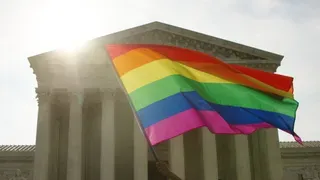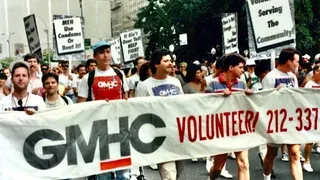January 23, 2009
'Underground Railway' Helps Iranian Gays to Freedom; Back Home, Iranians Enjoy Homo-Sex, Study Shows
Kilian Melloy READ TIME: 3 MIN.
Even as the situation in Iran has become so desperate for openly gay men that they must rely on an "underground railroad" to ferry them out of their country and out of harm's way, a new study indicates that many straight men in that country have had same-gender sexual experiences.
The UK gay Web site Pink News reported on the study in a Jan. 22 article.
The study, authored by an Iranian sociologist, shows that despite that country's Sharia [Muslim religious] law, which prescribes severe penalties for a range of sexual behavior--including masturbation, adultery, and consensual same-sex intimacy--nearly a quarter (24%) of the country's woman and around one-sixth (16%) of men had had sexual experiences with at least one person of the same gender.
The report, by university researcher Parvenah Abdul Maleki, also found that nearly three-quarters of men (73%) and over one quarter of women (26%) had admitted to masturbation.
The survey also looked more specifically at Iranians hailing from conservative religious backgrounds. From this demographic sample, about 4% admitted to sexual experiences with someone of the same gender, while 86% copped to adultery with an opposite-gender sexual partner.
Three-quarters (75%) admitted to having viewed pornographic material.
Iranian President Mahmoud Ahmadinejad denied the existence of gays and lesbians in Iran during a 2007 trip to the United States, saying, "In Iran we don't have homosexuals like in your country."
"In Iran we do not have this phenomenon," added Ahmadinejad.
The remark, made during an appearance at Colombia University in New York, drew jeers and invited speculation that it may have carried a darker undertone: because homosexuality is punishable by execution in Iran, the remark was interpreted in some quarters as a not-so-veiled reference to killing gays.
Indeed, the Pink News item pointed out that human rights watchdogs have accused Iran of killing 3,000-4,000 gays and lesbians since the country was taken over by Islamic theocrats in 1979.
A year after his claim that no homosexuals existed in his country, Ahmadinejad changed his claim, saying that gays, though "few," did indeed live in Iran, the Pink News article reported.
Ahmadinejad went on to say that the "few" gays in Iran were corrosive to society as a whole.
The Iranian president also slammed America for what he saw as acceptance of gays, saying, "It should be of no pride to American society to say they defend something like this."
Added Ahmadinejad, "Just because some people want to get votes, they are willing to overlook every morality."
Meantime, openly gay men and women often find they must flee Iran in order to survive.
As they make it to safety in Islamic countries with less lethal stances on homosexuality, or even find their way to non-Islamic countries, Iranian gays remember their compatriots back home, still liable to persecution and execution.
One means of helping those who remain trapped is to support efforts to get them out of Iran.
A Jan. 20 article in the Toronto Star profiled the efforts of Arsham Parsi, who as recently as 2006 was living in Turkey, a refugee from the anti-gay persecution that is common in Iran.
Parsi now lives in Toronto, where he works as the executive director for a group seeking to aid Iranian GLBTs to freedom.
Said Parsi, who heads Iranian Queer Railroad, "Every day, people escape, people come here."
Parsi says it's not enough to get gay Iranians to neighboring Islamic countries, where the law of the land may not persecute gays but society at large is liable to inflict suffering and harm.
Said Parsi, "People in Turkey say they're not homophobic and I say, 'You've living in Istanbul.
"'When you leave Istanbul, it's different.'
"Gays have been beaten on the streets in Turkey and the police do nothing," Parsi added.
For that reason, Parsi seeks to help gay refugees to Australia and to North America, working with the U.N. and with immigration officials.
Parsi himself had to flee, not only for being gay, but for resisting the government's religiously based laws and operating an online resource where gays could meet and talk.
That online resource led to a real-world group for Iranian gays. When the authorities got wind of his organizing, Parsi was obliged to stay one step ahead of them all the way out of the country and to freedom.
Even now, however, the young man--who has appeared as a speaker before the UN Human Rights Council and been recognized with awards from Pride Toronto and the International Gay and Lesbian Human Rights Commission--has to tread carefully.
Living in a free country has not entirely freed him from the death threats that religious extremists send his way, the Toronto Star article noted.
Kilian Melloy serves as EDGE Media Network's Associate Arts Editor and Staff Contributor. His professional memberships include the National Lesbian & Gay Journalists Association, the Boston Online Film Critics Association, The Gay and Lesbian Entertainment Critics Association, and the Boston Theater Critics Association's Elliot Norton Awards Committee.







